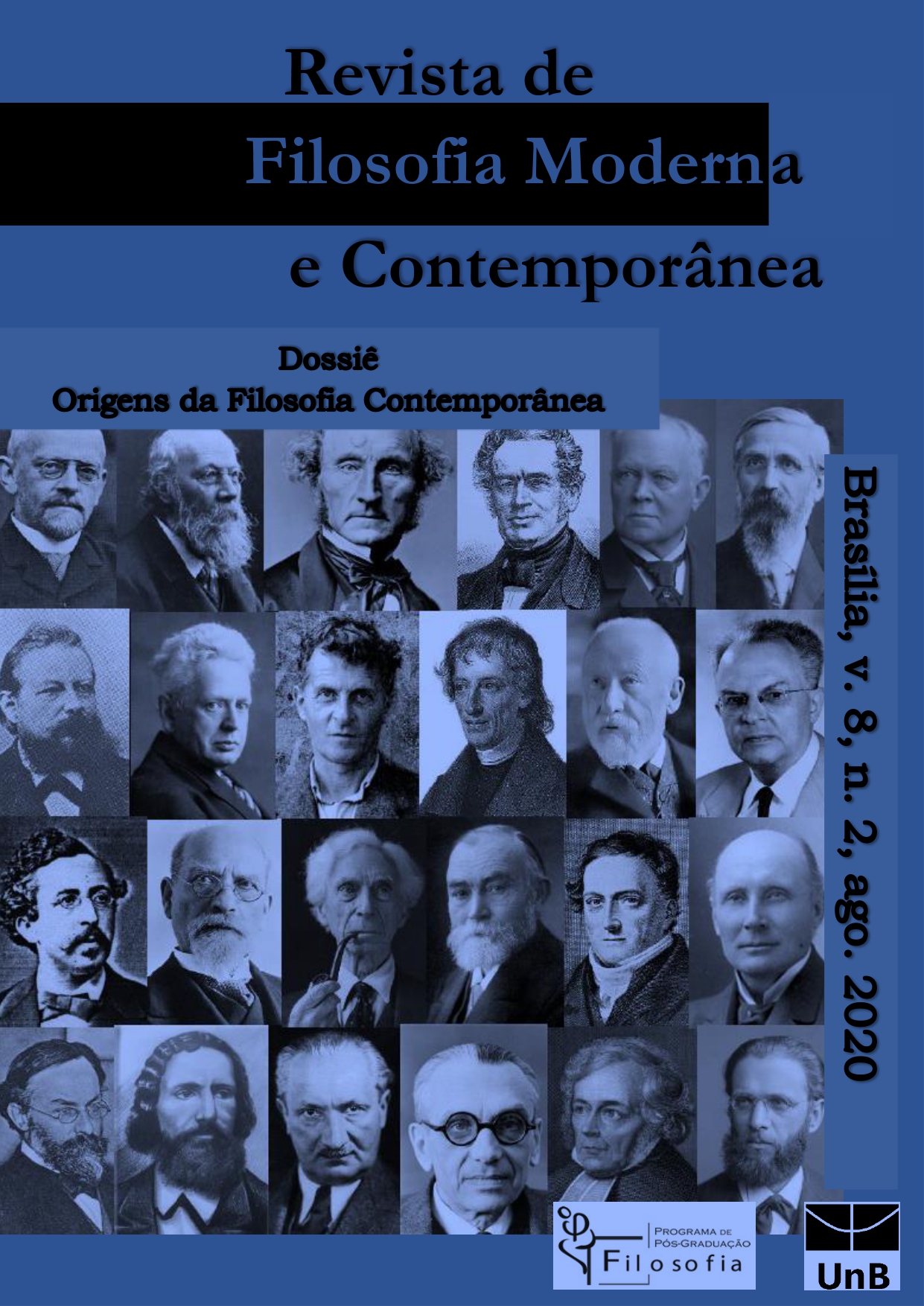Intentionality and the Logico-Linguistic Commitment
A Critique of Roderick Chisholm
DOI:
https://doi.org/10.26512/rfmc.v8i2.35865Palabras clave:
Chisholm. Intentionality. Intensionality. Propositional Attitudes. Logico-linguistic Commitment.Resumen
The aim of this article is to analyze and criticize Roderick Chisholm’s conception of intentionality, which has, historically, served as the point of departure for most accounts of intentionality in analytic philosophy. My goal is to highlight the problematic ‘logico-linguistic commitment’ presupposed by Chisholm, according to which mental concepts should be interpreted by means of semantic concepts. After addressing Chisholm’s differentiation between the ontological thesis (the idea that the intentional object might not exist) and the psychological thesis (the conception that only mental phenomena are intentional), as well as his defining criteria for intentionality (non-existential implication, independency of truth-value, and indirect reference), I focus on the manifold problems presented by his theory. First, the two initial criteria entail a conceptual confusion between the semantic concept of ‘intensionality’ and the mental concept of ‘intentionality’. Second, according to these criteria””and against Chisholm’s explicit intention””perception and other cognitive activities should not be considered intentional. Third, there are no grounds for the artificial conflation of intentionality and the concept of ‘propositional attitudes’””an equation which is an explicit tenet of the logico-linguistic commitment. In general, I argue that an interpretation of intentionality based on this commitment obscures the true meaning of the concept of intentionality, as it is presented, for instance, by phenomenology.
Descargas
Citas
BRENTANO, Franz. Psychology from an Empirical Standpoint, trans. Antos C.Rancurello, D.B.Terrell and Linda L. McAlister. London: Routledge, 2009.
BYRNE, Alex. “Intentionality”, in S. Sarkar / J. Pfeifer (eds.), The Philosophy of Science. An Encyclopedia. New York / London: Routledge, 2006.
CARNAP, Rudolf. Meaning and Necessity. A Study in Semantics and Modal Logic. Chicago: University of Chicago Press, 1956.
CHISHOLM, Roderick. Intentionality and the Theory of Signs, in Philosophical Studies 3, 1952.
______. Sentences About Believing in Meeting of the Aristotelian Society. London: 1956.
______. Perceiving. A Philosophical Study. Ithaca / London: Cornell University Press, 1957.
______. Believing and Intentionality: A Reply to Mr. Luce and Mr. Sleigh, in Philosophy and Phenomenological Research, Vol. 25, No. 2, 1964.
______. On Some Psychological Concepts and the ‘Logic’ of Intentionality in H.N. Castañeda (ed.), Intentionality, Minds and Perception. Detroit: Wayne State University Press, 1966.
______. Intentionality, in P. Edwards (ed.), The Encyclopedia of Philosophy, Vol. 4 New York / London: Collier ”“ MacMillan, 1967a.
______. Brentano on Descriptive Psychology and the Intentional in E.N. Lee / M. Mandelbaum (eds.), Phenomenology and Existentialism. Baltimore: John Hopkins Press, 1967b.
______. The First Person. An Essay on Reference and Intentionality. Brighton: The Harvester Press, 1981.
______. “My Philosophical Development” in Hahn, L. The Philosophy of Roderick M. Chisholm. Chicago / La Salle: Open Court, 1997.
CORNMAN, James. Intentionality and Intensionality in Philosophical Quarterly 12, 1962.
CRANE, Tim. The Objects of Thought. Oxford: Oxford University Press, 2013.
DENNET, Daniel. The Intentional Stance. Cambridge / London: MIT Press, 1987.
DRETSKE, Fred. The Intentionality of Cognitive States, reprinted in D. Rosenthal (ed.), The Nature of Mind. New York / Oxford: Oxford University Press, 1991.
FODOR, Jerry. Psychosemantics. The Problems of Meaning in the Philosophy of Mind. Cambridge / London: MIT Press, 1987.
HAHN, Lewis E. (ed.). The Philosophy of Roderick M. Chisholm. Chicago / La Salle: Open Court, 1997.
HARNEY, Maurita. Intentionality, Sense and the Mind. Dordrecht: Springer, 1984.
KENNY, Anthony. Action, Emotion and Will. London / Henley: Routledge & Kegan Paul, 1963.
KIM, Jaegwon. Chisholm on Intentionality: De Se, De Re, and De Dicto”, in Hahn, L. .). The Philosophy of Roderick M. Chisholm. Chicago / La Salle: Open Court, 1997.
______2003. Chisholm’s Legacy on Intentionality in Metaphilosophy, Vol. 34, No. 5, 2003.
KRIEGEL, Uriah 2011, The Sources of Intentionality (New York: Oxford University Press, 2011).
MARRAS, Ausonio. Intentionality, Mind and Language. Urbana / Chicago / London: University of Illinois Press, 1972.
MOHANTY, Jitendra N. The Concept of Intentionality. St. Louis: Warren H. Green, 1972.
MONTAGUE, Michelle. Against Propositionalism in Noûs, 41:3, 2007.
QUINE, Willard O. Word and Object. Cambridge: The MIT Press, 1960.
RUSSELL, Bertrand. The Philosophy of Logical Atomism, reprinted in his Logic and Knowledge. Nottingham: Spokesman, 2007.
______.The Analysis of Mind. Mineola: Dover Publications Inc., 2005.
SANFORD, David H. Chisholm on Brentano’s Thesis, in, Hahn L. The Philosophy of Roderick M. Chisholm. Chicago / La Salle: Open Court, 1997
SEARLE, John 1983, Intentionality. An Essay in the Philosophy of Mind. Cambridge: Cambridge University Press, 1983.
URMSON, James O. COHEN, Jonathan. Criteria of Intensionality in Proceedings of the Aristotelian Society, Supplementary Vol. 42, 1968.
Descargas
Publicado
Cómo citar
Número
Sección
Licencia
Derechos de autor 2020 Revista de Filosofia Moderna e Contemporânea

Esta obra está bajo una licencia internacional Creative Commons Atribución-NoComercial-SinDerivadas 4.0.
Los derechos de autor para artículos publicados en esta revista son del autor, con derechos de primera publicación para la revista. Debido a que aparecen en esta revista de acceso público, los artículos son de uso gratuito, con atribuciones propias, en aplicaciones educativas y no comerciales.


